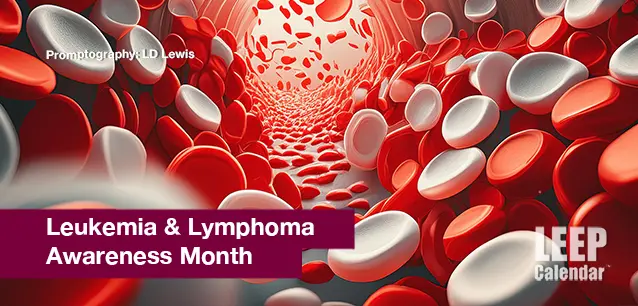 AD
AD
Today is: November 08
Scroll to explore events active on this date.
LEEP INK FEATURES

August is Appropos
A toddler playing in the fountain at a park in Santa Fe, New Mexico—Photo LD Lewis. In August, we live through the Dog Days of Summer. It's hot and often humid, and those ...

September is Sassy
Can you hear that sigh of relief from parents worldwide? Yes! September marks the return of students to school, a global phenomenon. Preparations for the ACT and SATs begin earnestly for ...

OOH LA LA, October
October is the busiest month for events, with 5% more happening than in May, the second most eventful month. Sailing enthusiasts will be glued to the finals of this year's Am...
About Leukemia and Lymphoma Awareness Month
United States
Ends: Sep 30, 2025
DESCRIPTION:
LEUKEMIA AND LYMPHOMA AWARENESS MONTH: ADVOCATING FOR BLOOD CANCER PATIENTS
Leukemia and Lymphoma Awareness Month is observed across the United States to raise awareness about these blood cancers and support those affected. The Leukemia & Lymphoma Society (LLS), a leading nonprofit organization dedicated to finding cures and ensuring access to treatments for blood cancer patients, champions the event.
THE HISTORY OF LEUKEMIA AND LYMPHOMA AWARENESS MONTH
The Leukemia & Lymphoma Society established Leukemia and Lymphoma Awareness Month to focus public attention on the challenges faced by those with blood cancers. Since its inception, the month has been critical for education, advocacy, and fundraising efforts to support research and patient services. Over the years, it has grown into a significant campaign involving communities, healthcare professionals, and policymakers nationwide.
WHAT ARE LEUKEMIA AND LYMPHOMA?
Leukemia and lymphoma are types of blood cancers that affect the body's ability to produce and function properly.
Leukemia—A cancer of the blood-forming tissues, including the bone marrow and lymphatic system. It results in the overproduction of abnormal white blood cells, which interfere with the body's ability to fight infections and produce healthy blood cells.
Lymphoma—A cancer that begins in the lymphatic system, part of the body's immune system. It affects lymphocytes, a type of white blood cell, and can lead to the growth of tumors in lymph nodes and other tissues.
HOW DO PEOPLE GET THESE DISEASES?
The exact causes of leukemia and lymphoma are not fully understood, but several factors can increase the risk:
Genetic Mutations—Changes in DNA can trigger the uncontrolled growth of abnormal cells.
Environmental Exposure—Exposure to certain chemicals, radiation, and infections can increase the risk.
Family History—A family history of blood cancers can raise an individual's risk.
Immune System Deficiencies—Conditions that weaken the immune system can make one more susceptible to these cancers.
CAN IT BE PREVENTED?
While there is no guaranteed way to prevent leukemia and lymphoma, specific measures can reduce your risk:
Avoiding Carcinogens—Limiting exposure to known carcinogens, such as certain chemicals and radiation, can help reduce risk.
Healthy Lifestyle—Maintaining a nutritious diet, regular exercise, and avoiding tobacco can support overall health and potentially lower cancer risk.
Regular Check-Ups—Routine medical check-ups can help detect abnormalities early, leading to prompt intervention and treatment.
HOW TO PARTICIPATE IN LEUKEMIA AND LYMPHOMA AWARENESS MONTH
Educate and Advocate—Learn about blood cancers and share information within your community to raise awareness.
Fundraise—Participate in fundraising events like the LLS's Light The Night walks or organize your events to support research and patient services.
Volunteer—Offer your time and skills to support local LLS chapters or other organizations working to fight blood cancers.
Donate—Contributions to organizations like LLS help fund research, patient support programs, and advocacy efforts.
Support Patients and Families—Show kindness to those affected by blood cancers, join support groups, or simply be a source of encouragement.
Leukemia and Lymphoma Awareness Month is a vital reminder of the impact of blood cancers and the importance of continued research and support. Through collective efforts, we can advance the fight against leukemia and lymphoma and improve the lives of those affected by these challenging diseases.
VIDEOS
SUPPORTING DOCUMENTS
Currently, this event does not have supporting documents.
ADDITIONAL IMAGES
Currently, this event does not have supporting images.
Where would you like to go now?
 AD
AD


/footer-logo.svg)
